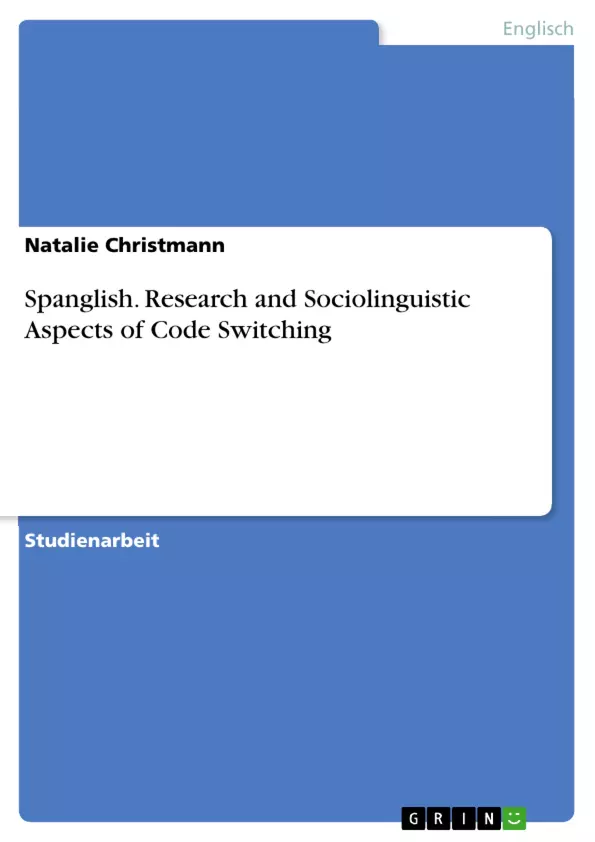As a student of English and Spanish Studies, I agree that the linguistic phenomenon of code switching deserves attention for two reasons: Not only does it seem to play such an important role in linguistics, but also in everyday life. That is why politicians or even natives speakers should be aware of the extent of the sociolinguistic aspects in language development in English-Spanish bilingual communities.
Furthermore, I wish to examine the famous term “Spanglish” and the change in attitudes towards the present concept since its emergence. I will discuss the sociolinguistic aspects and the term’s evolution in more detail in the last chapter of my paper. Referring to the particular identity of Hispanics living in the U.S., being able to manage two different languages, bilinguals are capable to code switch within their languages.
For this reason, it is essential to define code switching, including its three types of interaction, in the first place in order to distinguish the term in comparison to other linguistic phenomena, such as loan translation or loan words and lexical borrowing, with which one can easily comprehend. Because of the prevalence of lexical and grammatical theories, which have dealt with code switching for the last three decades, I have decided to focus on what are considered to be the three most relevant ones at present linguistic discourse: The Equivalence Constraint, The Free Morpheme Constraint and The Matrix Language Model.
In the last part of my paper, I will take a closer look at the term Spanglish in reference to its various implications and what can be included in its today’s definition. Additionally, I will include some examples of the use of Spanglish, in other words Spanish-English code switching.
Inhaltsverzeichnis
- Introduction
- Various Definitions of Code Switching
- Examples of English Loan Usage in Spanish
- Confining Code Switching to Lexical Borrowing
- Theoretical Approaches About the Use of Code switching
- The Equivalence Constraint
- The Free Morpheme Constraint
- The Matrix Language Frame
- The Term Spanglish
- Conclusion
Zielsetzung und Themenschwerpunkte
Diese Arbeit befasst sich mit dem Phänomen des Code-Switchings in bilingualen Englisch-Spanisch sprechenden Gemeinschaften. Sie zielt darauf ab, die verschiedenen Definitionen von Code-Switching zu untersuchen, verschiedene theoretische Ansätze zu beleuchten und die Entwicklung und Bedeutung des Begriffs "Spanglish" zu beleuchten.
- Definitionen und verschiedene Ansätze zum Code-Switching
- Theorie des Code-Switchings: Equivalence Constraint, Free Morpheme Constraint und Matrix Language Frame
- Die Rolle des Code-Switchings in der Sprachentwicklung
- Sociolinguistische Aspekte von Code-Switching
- Die Entstehung und Entwicklung des Begriffs "Spanglish"
Zusammenfassung der Kapitel
Das erste Kapitel untersucht den Kontext und die Bedeutung von Code-Switching in der heutigen Gesellschaft und stellt die Relevanz bilingualer Kompetenzen in einer globalisierten Welt heraus.
Das zweite Kapitel analysiert verschiedene Definitionen von Code-Switching und beleuchtet die Herausforderungen, die mit der Abgrenzung von Code-Switching von anderen Sprachkontaktphänomenen verbunden sind.
Das dritte Kapitel präsentiert drei wichtige theoretische Ansätze zum Code-Switching: den Equivalence Constraint, den Free Morpheme Constraint und das Matrix Language Frame. Es diskutiert die jeweiligen Stärken und Schwächen dieser Modelle.
Schlüsselwörter
Code-Switching, Spanglish, Bilingualismus, Sprachentwicklung, Sprachkontaktphänomene, Sociolinguistik, Equivalence Constraint, Free Morpheme Constraint, Matrix Language Frame.
Häufig gestellte Fragen
Was ist der Fokus dieser Arbeit über Spanglish?
Die Arbeit untersucht das Phänomen des Code-Switchings in englisch-spanischsprachigen Gemeinschaften und die Entwicklung des Begriffs "Spanglish".
Was bedeutet Code-Switching in der Linguistik?
Code-Switching bezeichnet die Fähigkeit von Bilingualen, innerhalb einer Interaktion oder eines Satzes zwischen zwei verschiedenen Sprachen zu wechseln.
Welche theoretischen Ansätze werden zur Erklärung von Code-Switching herangezogen?
Es werden drei relevante Modelle diskutiert: Der Equivalence Constraint, der Free Morpheme Constraint und das Matrix Language Frame Modell.
Wie unterscheidet sich Code-Switching von lexikalischer Entlehnung?
Die Arbeit grenzt Code-Switching von Phänomenen wie Lehnübersetzungen, Lehnwörtern und reinem Vokabelimport ab, um die strukturelle Komplexität des Sprachwechsels zu verdeutlichen.
Warum ist das Thema Spanglish soziolinguistisch relevant?
Es spiegelt die Identität von Hispanics in den USA wider und zeigt, wie Sprachentwicklung und gesellschaftliche Einstellungen gegenüber bilingualen Gemeinschaften zusammenhängen.
- Arbeit zitieren
- Natalie Christmann (Autor:in), 2015, Spanglish. Research and Sociolinguistic Aspects of Code Switching, München, GRIN Verlag, https://www.grin.com/document/299269



